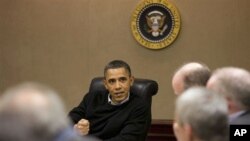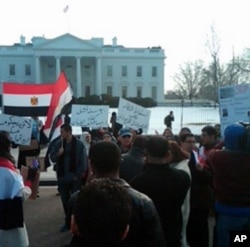U.S. President Barack Obama on Sunday called for an orderly transition in Egypt to a government that reflects the aspirations of the Egyptian people. The president spoke by telephone with world and Middle East leaders about the situation in Egypt.
Mr. Obama received "multiple updates" throughout the day from his staff, and a White House statement said he was on the telephone with regional and global leaders.
He spoke with Israeli Prime Minister Benjamin Netanyahu, British Prime Minister David Cameron, and with King Abdullah of Saudi Arabia and Turkish Prime Minister Recep Tayyip Erdogan.
A White House statement said President Obama reiterated the focus he has placed on opposing violence, calling for restraint and supporting universal rights, including the right to peaceful assembly, association and speech.
It said the president also supported "an orderly transition" to a government that is responsive to the aspirations of the Egyptian people, and asked each of the leaders he spoke with for their assessment of the situation.
Turkish media quoted a statement from Mr. Erdogan's office as saying the two leaders agreed on "the necessity of meeting the legitimate and democratic rights of the people in the region" and "voiced the hope that the developments in the regional countries would not lead to deep and fundamental instabilities."
A White House aide said neither President Obama nor his national security adviser Tom Donilon had spoken with Egypt's ambassador in Washington, Sameh Shoukry.
The ambassador told ABC television's This Week program that his country is "going through a difficult time," but stressed that Egypt was already on a path to reform when the protests began.
In the street in front of the White House, demonstrators shouted anti-Mubarak slogans and called for his ouster. Among them were Mohammad Mosalem and Esam Youssef.
"Egyptian people are looking for freedom. We don't look for any crazy extremists to run the country," said Mosalem.
"All we need from the United States is just to stop supporting Mubarak. That's all. We don't need anything else. Just stop supporting Mubarak," said Youssef.
Monaem Mabrouki is from Tunisia, where an uprising recently forced the ouster of that country's president. He says President Obama has been taking the right steps where Egypt is concerned.
"He cares about the whole world. And he knows that a real democracy in the Arab world is security to the United States," he said.
There was no indication from the White House late Sunday of the extent to which President Obama's calls with world leaders included discussion of the role of Egyptian opposition figure Mohamed ElBaradei.
ElBaradei told protesters in Cairo that they "cannot go back" after starting the uprising against Mubarak, and in a series of television interviews Sunday said the United States should withdraw support for President Mubarak.

